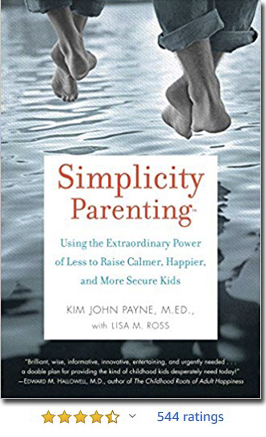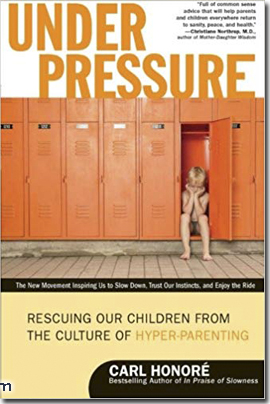
Having busy kids often happens because you want the best for them: more opportunities to learn and play, more friends, more fun!
But when more becomes too much, you might want to rethink your schedule and try to “un-busy” your kids a bit. I sure am happy I did!
How I Got My Son Busy Without Even Realizing It
I am a stay-at-home mom, and I spent the first year with my son literally staying-at-home.
He was not sleeping at night. He was not napping during the day. Going out was just too difficult for my exhausted self, and anyway, I had nowhere to go! I was new in a town that was not big on playgroups, and I knew nobody. We were definitely not busy, and it was quite a long year, if you ask me.
But by the second year, I had found a toy library with a play area where other toddlers were going. Sure, it was 30 minutes away — and we needed to take the tramway and then walk to get there — but we were finally out of the house and meeting people!
My son usually had terrible tantrums around the clock, but it seemed to magically stop when we were at that toy library. The fact that it was much worse afterwards didn’t seem relevant.
Soon, I made “mom friends” with kids the same age as my son, many of them working part time and living only 30 minutes from us. We started seeing them as often as we could.
Then, when my son was three, we decided to homeschool him instead of sending him to nursery school, so we joined a homeschooling group that organized days out, visits and playdates around town.
And just like that, our agenda had gone from desperately empty to drowning full.
We were busy all the time, running from one place to another, eating lunch in the tramway, trying to see everybody and do everything, and never ever stopping to just relax and play at home because a) my son never wanted to play by himself and b) home was where most of the tantrums occurred.
It was stressful, but my son never seemed tired. Even after such busy days, he still took forever to fall asleep, never going to bed before us and still waking up in the middle of every night.
The Wake-Up Call

We were on the tramway one day, coming back from another busy day in town, facing each other. I asked my son if he was tired, because he looked tired — and I sure was tired myself! — but he answered : “I’m not tire…”
And he fell asleep.
While talking.
At first I thought it was funny and cute. So typical of him to not recognize how tired he was when, in fact, he was literally falling asleep.
But then it got me thinking. How was it that my son was so tired that he was falling asleep on the tramway? In the middle of a sentence?
Was it normal? It was proof of how busy we had been, how many fun things we had been doing, how many friends he had been seeing. But were all these good things really good for him? And up to what point? Was it good to have a busy kid, or was it a problem?
At that moment, I realized that just because my son would never admit he was tired didn’t mean he wasn’t. And tired he was.
I’m sure you know what I am talking about. Whether your child is a toddler, a teen or somewhere in between, in today’s world it is so easy to get carried away and completely pack their schedule without even realizing it!
I decided on the spot to make sure it would not happen again. I would make sure our agenda would be less busy, leaving him time to do nothing and rest. Leaving him days where we wouldn’t go further than around the house. Surely it would be easy.
Well, it wasn’t.
The Fears That Keep Us From Slowing Down

While trying to slow down and “un-busy” my child, some fears came up that almost stopped me from trying. Maybe you, too, have some of them?
- The fear that my kid would never be tired enough to sleep
He already took forever to fall asleep when he was running around so much. Surely, empty days would make it even worse!
I was afraid to test it.
- The fear of missing out (FOMO)
For him: Would he still have such good friends if he didn’t see them as often? Would he miss out on an amazing opportunity to learn and have fun by not going to this or that museum with his friends?
For me, too: How could I enjoy being stuck at home, when I knew my friends and their kids were out together?
- The fear of limiting your child’s future
Maybe your kid could be the next Michael Jordan if only he went to basketball club every weekday? What about music? To be as good as Beethoven, your kid should start playing piano, like, yesterday.
And what if your child’s whole academic and financial future depends on the tutoring lessons he is going to after school? Surely you shouldn’t cancel them!
- The fear of disappointing people by canceling commitments
At that time, I was actively volunteering at the toy library AND with the homeschooling group. Both were very busy groups with lots of projects, and I was part of most of them. People had expectations for me.
Saying no to some of my commitments seemed impossible without hurting people and making their lives more difficult. I didn’t want that.
- The fear of being an idle parent
It sounded like bad parenting to not offer every opportunity to my child to learn and play and make friends if I had the time to do it. It also seemed bad not to make sure my kid was entertained every single minute of the day.
Or was it the fear of being seen as an idle parent? People can be very judgemental to moms sometimes…
- The fear of being stuck at home with a child prone to tantrums and incapable of entertaining himself
Need I say more?
Continuing with the status quo with a busy kid seemed much easier than facing these fears, but I felt it was too important to give up.
So, little by little, I tried to free some space in our schedule, but it was hard. It wasn’t until a big change in our lives let us really find a new and slower rhythm.
The Blank Slate

We moved. New town, new country, new life. And with it, an opportunity.
A blank slate.
An empty agenda. No commitments. No places to be. No friends to see.
Now, I didn’t want it to stay that way. I did want to make new friends for my son and me. I did want to discover new places to go. But this time, I wanted to do it right. I wanted to do it with intention.
So I checked online to find the different activities this town had to offer to kids. I tried ones that seemed like the best ones for us, one at a time, and decided on which ones to keep going to.
If there were two on the same day, we would pick our favorite and do only that, even if they were not at the same time. Saying no to one of them let us have the opportunity to say a real yes to the other, committing to really focus on and enjoy it.
Once we had our week planned, nothing was set in stone. I kept open the option to cancel any activity planned any day at any time. If we were feeling tired, we didn’t go to the playgroup, or to the science museum.
The museum would still be there the next day, but our sanity might not if we didn’t rest!
I fought the voices in my head telling me we were not doing enough.
I continued to make choices along the way. For example, a playgroup that had been great at first because it helped us make new friends was starting to feel like an obligation, so we stopped going.
There was another playgroup where my son would have so much fun, but it made him over-excited and prone to tantrums afterwards. We decided to go only twice a month. Could we try more often? Should we try less often? The question was always open.
I decided on a limit of structured activities or outings per day and per week. No more than one a day, no more than three a week. The rest of the time, we were home or at the park.
Although it seemed like such a low-key schedule might make our lives worse, I soon found that it made them better in so many ways!
The Advantages of Having Less Busy Kids

- Less battles around bedtime
I found that running in the park instead of running to somewhere was much more effective to help my son fall asleep at bedtime. So was playing at home in a calm environment. He still needed me to be with him at bedtime, and he was still waking up at night, but not as much anymore. The fact that I was more rested during the day also made it easier for me to deal with the nights.
- More time for what mattered
Saying no to a busy day filled with structured activities made time for all the rest.
Time for discussions. Time for spontaneous playdates. Time for lazy picnics in the park. Time to look at that snail eating the plant. Time to ask questions. Time to answer them. Time to dream.
Unstructured time is good for kids. You can read why in Simplicity Parenting by Kim John Payne.
- More independent play
My son learned the joys of independent play. It wasn’t easy at first, but it was something I thought was very important for him as well as for me, so we took the time to work on it. We took it slow. We had the time.
- Enjoying more of each other at home
I also learned to enjoy our time at home more, by cooking, reading or painting together. Even tidying became fun when done together and in no rush. The same went for homework once he went to school.
- Less tantrums
The tantrums stopped! They diminished then they just stopped. That in itself should be enough to give this “un-busy” effort a try.
How You Can “Un-Busy” Your Child, Too

Just move to the other end of the planet. Easy peasy. (I’m joking).
You don’t have to actually move. You just have to imagine you moved to the house you are in right now. That’s your blank slate.
Imagine you just got there, with the advantage that you already know the people and places in your town.
Think about some of these questions:
- How would you fill your agenda if it were empty? Choose wisely and with intention.
- What places do you really like to go? Are they close to home? Do both you AND your child like them?
- Which activities are worth your time AND your energy?
- How do you and your kid want to feel at the end of the day? What makes you feel like that?
- Which friends make you feel better after seeing them? Which friends would you miss if you had to move out of the country tomorrow? See more of them, and less of the ones who didn’t make your list!
- Leave space before and after activities. Choose a limit of activities per day and per week. Do not try to cram as many activities as you can on the same day just because they are in the same area.
- Once you have your dream week, compare it to your actual week. What changes need to be made?
- Do you have to cancel commitments or say no to new ones? Do you first have to get around the idea that it might disappoint people? I’ve been there, it’s not easy. Before I moved, I had started to unvolunteer to some of my commitments. Explaining to people that I didn’t have the time to do something I used to because I wanted to slow down, was tough. Especially when you could see how disappointed they were. But remember why you do it, and you will find the strength to say no.
- Will you stop going to some places? Or go less often? Let your child know what to expect. Changing rhythm will be good for him, but it might be confusing at first!
Keep reviewing your agenda everyday. Is going to that activity worth it today?
If yes, go, and make sure you have plenty of down time before and after that.
If not, stay home, and rejoice because your child needs that time of unstructured playtime to learn. Because he needs that time of calm to explore. Because he needs that time of rest to grow.
We decided to send our son to school after a while, and the first year, we made sure his days were filled just with school. That was busy enough for him! The rest of the day would be spent at home or in the park, and it worked well for him.
But in the second year, we thought we could add just one activity to each week, so he went to soccer on Wednesday. Then his school offered tennis after school on Tuesday, so he went there, too. You see, he loves sports, so it was good for him.
Then his friends were all going to Scouts, late on Thursday evenings. He had to go too, right?
Add a birthday party to attend every weekend and homework after school, and just like that, and without noticing, we were back to a full agenda and back to anger bursts.
Luckily, this time, we knew what to do. We didn’t move out of the country. But we did go back to planning our “un-busy” week, making sure it was filled again with more free time than formal activities.
Busy-ness creeps quite easily in life, so going back to the “un-busying” process is necessary from time to time. Make sure you’re taking the time to review your schedule and make adjustments when you need to.
Like Carl Honoré — strong voice in the slow-movement — says in the book Under Pressure, we need to “put the child back into childhood”. And stopping their busy-ness is a good start to it.
The 2-Minute Action Plan for Fine Parents
Think about how your schedule is right now.
- How many activities does your kid go to every day? How many every week?
- How much time does your kid spend in transport to/from activities or school every day?
- Do you or your kid feel tired during the day or at the end of it?
- How often does your kid have free time to play?
- Do you and your kid have time to sit and eat proper meals most of the time?
The Ongoing Action Plan for Fine Parents
Work on making your “dream week” a reality, week after week. It will take time, but every step in the process will help your child get “un-busy.”
Don’t renew that class when it comes to an end. Say no to new commitments, and cancel the ones that didn’t make your list.
Book time slots in your agenda for unstructured play time so you make sure there’s always time for it.
Also be sure to go back to your perfect week from time to time to reassess whether you’re living the way you and your kids want to, and change your schedule if you need to along the way.
Busy kids are not always happier kids, and with this in mind, you can build a happier, more peaceful life for your whole family.


Leave a Reply